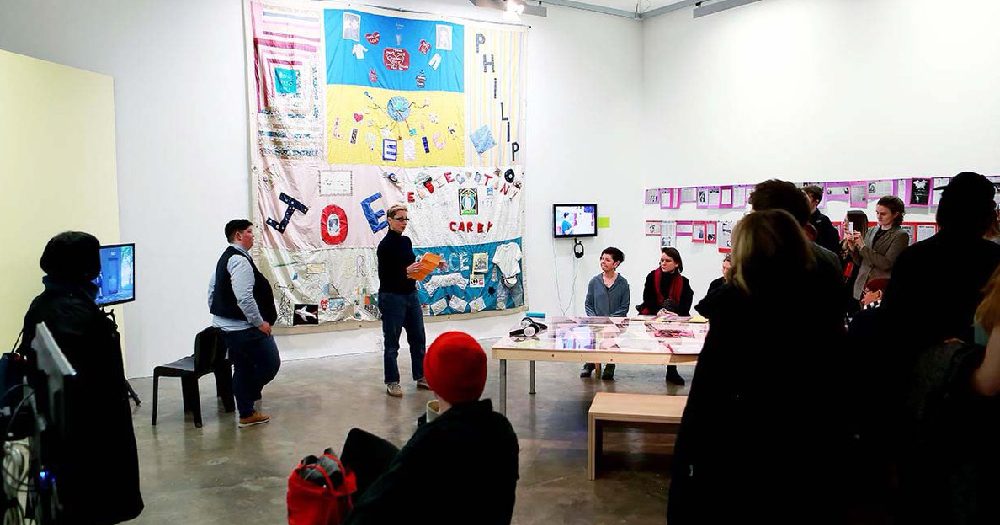A week before lockdown, Project Arts Centre launched Queer-in-Progress. Timeline; a research initiative aimed at expanding the narrative of Irish queer history. Project reopened its doors last week and will be running the display in the gallery until September 26.
In 2017, Lívia Páldi, Curator of Visual Arts at Project Arts Centre, began an extensive research initiative, Active Archive – Slow Institution. The first chapter, The Long Goodbye, was displayed in January 2019. It delved into Project’s 50+ year history and was curated in collaboration with curator, writer, educator Valerie Connor.
Through archival research and artistic responses, it explored a range of notable events, among them were; the OFF Site visual arts programme which Project mounted throughout the city during 1998 and 1999; the Demolishing Project – 39 East Essex is Closed by late Maurice O’Connell; the fires of 1982 that severely damaged the old Project building; and a number of LGBT+ plays that were put on in Project throughout the seventies, eighties and nineties. This theatre research went on to form the foundations for the second chapter, Queer-in-Progress. Timeline.
Queer-in-Progress is intended to be a conversation around what a queer archive and expanded telling of our histories, might look like. It focuses primarily on lesbian, feminist and trans narratives but also on HIV and AIDS. The timeline of research, as it was originally displayed was intended to act as a tool to prompt people to share their own experiences and understandings of what it means or has meant to be queer in Ireland. Through a number of discussion groups, workshops and an open call, people were invited to bring in memorabilia, share stories or contribute in whatever way they felt might add.
We're delighted to announce that we're finally re-opening the doors to the big blue building! Today! We're very much looking forward to welcoming you back ?
Book into the Gallery now for a free 45min slot ? https://t.co/Fahq5hejqM
Attendance Guidance ? https://t.co/3pA6FQqiZq pic.twitter.com/VntmVdDN8s— Project Arts Centre (@projectarts) August 27, 2020
Sadly, due to the current pandemic, the open call has had to be withdrawn and the display has been slightly reconfigured. In the gallery, there are a few different elements. There are six documentary films being shown; two films by Linda Cullen, We’re Here, We’re Queer, We’re Irish (1994) which looks at the ILGO (Irish Lesbian and Gay Organisation) fighting to participate in the New York St. Patrick’s Day parade, and Lust for Power: The 2nd International Dyke March (1998) which was held in Dublin; Caroline Campbell’s Our Love is History (2013), an intergenerational look at the Dublin lesbian and gay clubbing and cruising scene of the eighties and nineties.
Cara Holmes’ The Future of Feminism (2008) introduces the concept of feminism in Ireland; Sonya Mulligan’s Outitude: The Irish Lesbian Community (2018) consisting of interviews exploring the Irish lesbian community; and finally Mary Shannon: The Irish Names Quilts (2019), an interview with the late Mary Shannon, founder of the Irish Names Quilts project, explaining the meaning behind the quilts.
One of the highlights of the Queer-in-progress display is one of the quilts. Designed in the early nineties, it is one of thirteen quilts that were made in Ireland by family and friends to remember people who had died from HIV and AIDS. At an awe-inspiring 12ft in length, it is a powerful testament to an often forgotten part of Irish history.
Along either side of the gallery are two timelines of archival documentation. The first records HIV and AIDS histories from the eighties and nineties. It is made up of articles from GCN’s archive and the Irish Queer Archive that highlight issues such as women’s sexual health, the government’s neglect in recognising the AIDS epidemic, and the wider public stigma attached to the disease. This timeline has become particularly significant in light of COVID and draws some interesting comparisons.
The second timeline focuses on lesbian, feminist, female-identifying and bi histories. The display is also made up of articles from GCN and the Irish Queer Archive spanning the seventies, eighties and nineties. Through the Dykes Forum articles, they shed light on the lived experiences of different aspects of lesbian life in the nineties. The timeline also highlights some of the seminal events such as the 1977 contraception train, the Women’s Show, Lesbian Lives conferences, lesbian theatre and the infamous lesbian billboard in Donnybrook.
Queer-in-Progress. Timeline runs until September 26 in Project Arts Centre. The gallery is open Wednesday to Saturday, from 1 pm to 5 pm. Admission is free but space is limited so booking is essential. Click here to book.
© 2020 GCN (Gay Community News). All rights reserved.
Support GCN
GCN is a free, vital resource for Ireland’s LGBTQ+ community since 1988.
GCN is a trading name of National LGBT Federation CLG, a registered charity - Charity Number: 20034580.
GCN relies on the generous support of the community and allies to sustain the crucial work that we do. Producing GCN is costly, and, in an industry which has been hugely impacted by rising costs, we need your support to help sustain and grow this vital resource.
Supporting GCN for as little as €1.99 per month will help us continue our work as Ireland’s free, independent LGBTQ+ media.
